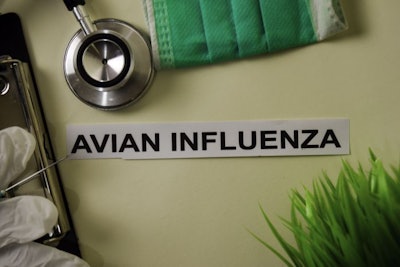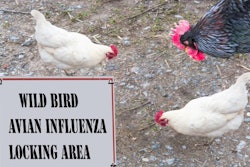
In the past week, the animal health agencies of two Western Asian states have officially registered new outbreaks of highly pathogenic avian influenza (HPAI) in their respective poultry populations.
According to the report from the Republic of Iraq to the World Organisation for Animal Health (OIE), the H5N8 HPAI virus variant was detected at a farm in mid-June. Affected was a premises in the eastern governorate of Wasit. Here, 45,000 birds died out of a flock of 85,000.
This virus variant has been present in Iraq since January of this year, but this latest outbreak is the first to have been registered in Wasit. It brings the country’s total outbreaks to four. Directly impacted have been 345,000 poultry.
In the Islamic Republic of Iran, there have now been 55 outbreaks of HPAI linked to the same virus subtype since December of 2020. Including 51 wild species, these have involved more than 1.3 million birds.
Latest outbreak confirmed by the authorities to the OIE was in a flock of 97 birds in the area of the capital city, Tehran. The types of birds and premises are not specified in the report.
Taiwan confirms HPAI at farm
A flock of almost 12,000 broiler breeders is the latest to be affected by the H5N5 HPAI virus in Taiwan. More than 1,600 of the birds at a farm in Yunlin county died in early June, and over 10,000 have been culled to control the further spread of the infection. This latest outbreaks brings the county’s total to eight so far this year.
Since this virus strain was first detected in the territory in September of 2019, 69 outbreaks have been confirmed. Around 558,000 poultry have been lost to the disease through mortality or destruction.
Avian flu resolved in Cambodia
The H5N1 HPAI situation is Cambodia has been resolved, according to a recent report to the OIE.
This declaration followed a single confirmed outbreak in around 2,000 poultry in backyard flocks in early January of this year. Affected were birds in one village in the western province of Battambang, which borders Thailand.
China reports HPAI in wild birds in Ningxia
Last week, China’s agriculture ministry confirmed that a wild bird had tested positive for the H5N8 HPAI virus in the Ningxia Hui Autonomous Region. It was found in an area on the border of the city regions of Lingwu and Wuzhong.
Earlier this month, an outbreak of HPAI linked to the same virus subtype was reported in Shaanxi province, which borders Ningxia to the east. Both provinces are in Northwest China. The Shaanxi outbreak involved the mass mortality of water birds at a nature reserve.
South Korea extends period for tariff-free egg imports
Temporary removal of tariffs on imported eggs has been extended until the end of the year, reports Yonhap news agency. The move aims to stabilize egg prices, following a number of HPAI outbreaks that hit the nation’s egg producers particularly hard.
According to this source, local firms will be able to import 36,000 metric tons (mt) of fresh eggs and egg products without tariffs until December 31.
In the period January-June, tariff-free imports of 50,000mt of eggs were authorized. Up to the end of May, this amounted to 144 million eggs. Previously, such trade was subject to duties of 8-30%.
In May, consumer prices had risen by 2.6% year-on-year, according to the news agency. The fastest rate for nine years, this was partly attributed to the rising cost of food.
Since HPAI hit South Korea in November of 2020, 109 outbreaks of the disease linked to the H5N8 virus were confirmed. These directly involved almost 10.26 million poultry — 22,000 mortalities and 10.24 million culls. No new cases have been reported for almost two months.
New HPAI outbreaks in four South African poultry flocks
Over the past week, South Africa’s veterinary agency has registered four new outbreaks of HPAI in poultry with the OIE. At each location, presence of the H5N1 HPAI virus variant was confirmed.
Involving a total of almost 242,000 poultry, all four outbreaks began in the period June 2-9. Three were at commercial farms — one in each of the provinces Western Cape, Gauteng, and Eastern — and one was in a backyard flock in the Cape Town area (Western Cape).
These latest outbreaks bring the country’s total since March of this year to 30. Losses of birds as a result of mortality or culling now exceeds 2.39 million.
Earlier this month, the poultry industry association described HPAI control as its highest priority for South Africa’s poultry sector.
Since May of 2021, the same virus has been detected in a number of wild birds. Latest reports confirm 53 new cases since mid-May. These include a group of 42 individuals in the West Coast district, and the others were all discovered in Cape Town.
A number of African countries — including Botswana, Lesotho, Mozambique, and Namibia — have banned imports of live birds and poultry products from South Africa since the HPAI outbreaks hit the country’s commercial sector.
No new outbreaks in Lesotho
Lesotho recently became the ninth African state to report HPAI in poultry so far this year.
According to the latest official report to the OIE, no new cases have come to light in this southern African country since May 22. That was the start of a second outbreak linked to an H5 HPAI virus.
View our continuing coverage of the global avian influenza situation.

















